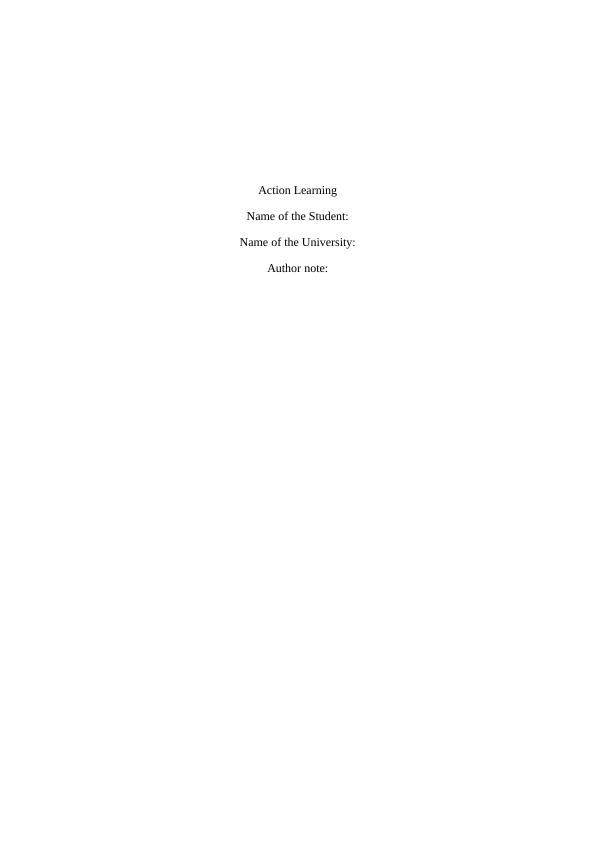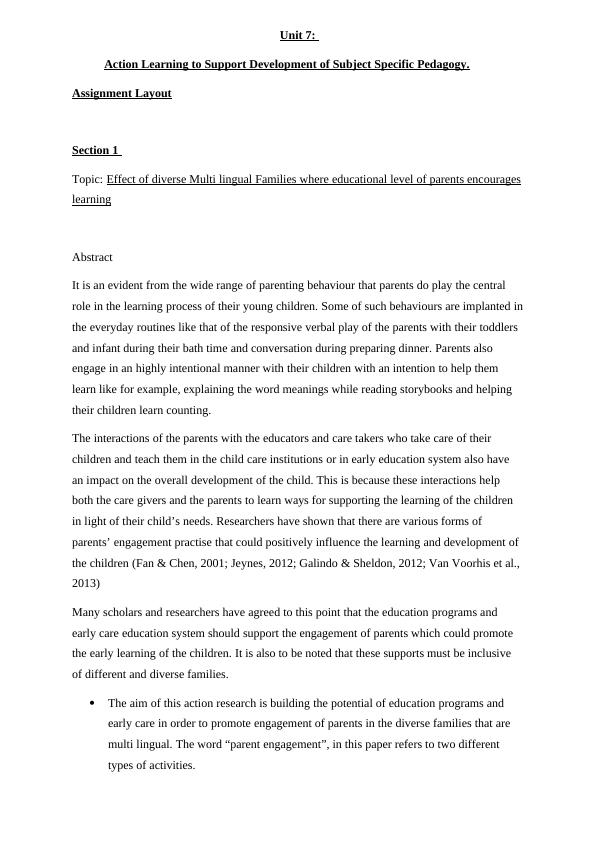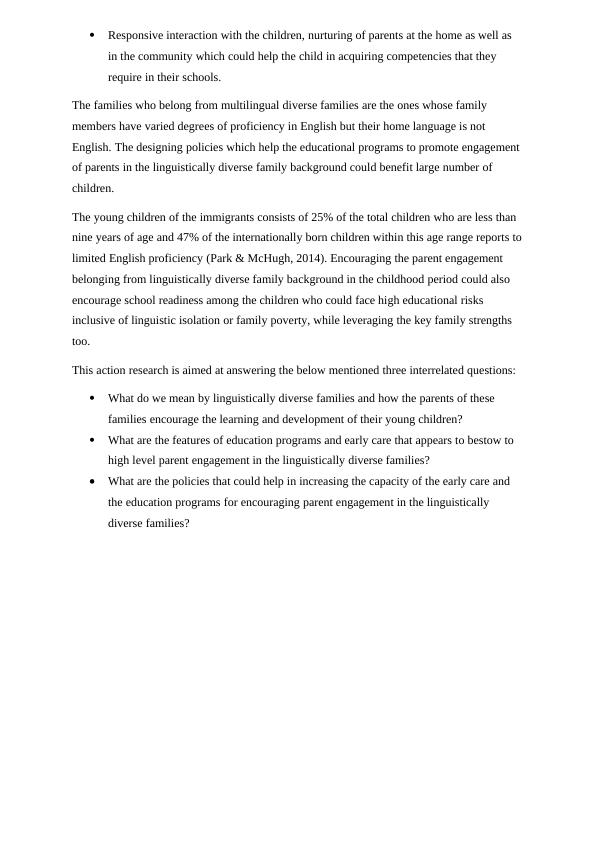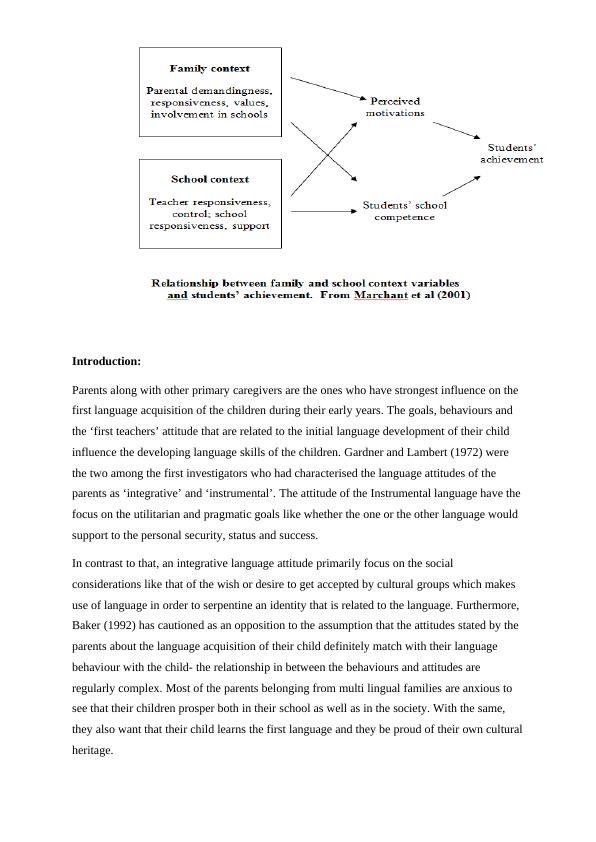(PDF) What is Action Learning?
Added on 2021-05-31
14 Pages4737 Words43 Views
Action Learning
Name of the Student:
Name of the University:
Author note:
Name of the Student:
Name of the University:
Author note:

Unit 7:
Action Learning to Support Development of Subject Specific Pedagogy.
Assignment Layout
Section 1
Topic: Effect of diverse Multi lingual Families where educational level of parents encourages
learning
Abstract
It is an evident from the wide range of parenting behaviour that parents do play the central
role in the learning process of their young children. Some of such behaviours are implanted in
the everyday routines like that of the responsive verbal play of the parents with their toddlers
and infant during their bath time and conversation during preparing dinner. Parents also
engage in an highly intentional manner with their children with an intention to help them
learn like for example, explaining the word meanings while reading storybooks and helping
their children learn counting.
The interactions of the parents with the educators and care takers who take care of their
children and teach them in the child care institutions or in early education system also have
an impact on the overall development of the child. This is because these interactions help
both the care givers and the parents to learn ways for supporting the learning of the children
in light of their child’s needs. Researchers have shown that there are various forms of
parents’ engagement practise that could positively influence the learning and development of
the children (Fan & Chen, 2001; Jeynes, 2012; Galindo & Sheldon, 2012; Van Voorhis et al.,
2013)
Many scholars and researchers have agreed to this point that the education programs and
early care education system should support the engagement of parents which could promote
the early learning of the children. It is also to be noted that these supports must be inclusive
of different and diverse families.
The aim of this action research is building the potential of education programs and
early care in order to promote engagement of parents in the diverse families that are
multi lingual. The word “parent engagement”, in this paper refers to two different
types of activities.
Action Learning to Support Development of Subject Specific Pedagogy.
Assignment Layout
Section 1
Topic: Effect of diverse Multi lingual Families where educational level of parents encourages
learning
Abstract
It is an evident from the wide range of parenting behaviour that parents do play the central
role in the learning process of their young children. Some of such behaviours are implanted in
the everyday routines like that of the responsive verbal play of the parents with their toddlers
and infant during their bath time and conversation during preparing dinner. Parents also
engage in an highly intentional manner with their children with an intention to help them
learn like for example, explaining the word meanings while reading storybooks and helping
their children learn counting.
The interactions of the parents with the educators and care takers who take care of their
children and teach them in the child care institutions or in early education system also have
an impact on the overall development of the child. This is because these interactions help
both the care givers and the parents to learn ways for supporting the learning of the children
in light of their child’s needs. Researchers have shown that there are various forms of
parents’ engagement practise that could positively influence the learning and development of
the children (Fan & Chen, 2001; Jeynes, 2012; Galindo & Sheldon, 2012; Van Voorhis et al.,
2013)
Many scholars and researchers have agreed to this point that the education programs and
early care education system should support the engagement of parents which could promote
the early learning of the children. It is also to be noted that these supports must be inclusive
of different and diverse families.
The aim of this action research is building the potential of education programs and
early care in order to promote engagement of parents in the diverse families that are
multi lingual. The word “parent engagement”, in this paper refers to two different
types of activities.

Responsive interaction with the children, nurturing of parents at the home as well as
in the community which could help the child in acquiring competencies that they
require in their schools.
The families who belong from multilingual diverse families are the ones whose family
members have varied degrees of proficiency in English but their home language is not
English. The designing policies which help the educational programs to promote engagement
of parents in the linguistically diverse family background could benefit large number of
children.
The young children of the immigrants consists of 25% of the total children who are less than
nine years of age and 47% of the internationally born children within this age range reports to
limited English proficiency (Park & McHugh, 2014). Encouraging the parent engagement
belonging from linguistically diverse family background in the childhood period could also
encourage school readiness among the children who could face high educational risks
inclusive of linguistic isolation or family poverty, while leveraging the key family strengths
too.
This action research is aimed at answering the below mentioned three interrelated questions:
What do we mean by linguistically diverse families and how the parents of these
families encourage the learning and development of their young children?
What are the features of education programs and early care that appears to bestow to
high level parent engagement in the linguistically diverse families?
What are the policies that could help in increasing the capacity of the early care and
the education programs for encouraging parent engagement in the linguistically
diverse families?
in the community which could help the child in acquiring competencies that they
require in their schools.
The families who belong from multilingual diverse families are the ones whose family
members have varied degrees of proficiency in English but their home language is not
English. The designing policies which help the educational programs to promote engagement
of parents in the linguistically diverse family background could benefit large number of
children.
The young children of the immigrants consists of 25% of the total children who are less than
nine years of age and 47% of the internationally born children within this age range reports to
limited English proficiency (Park & McHugh, 2014). Encouraging the parent engagement
belonging from linguistically diverse family background in the childhood period could also
encourage school readiness among the children who could face high educational risks
inclusive of linguistic isolation or family poverty, while leveraging the key family strengths
too.
This action research is aimed at answering the below mentioned three interrelated questions:
What do we mean by linguistically diverse families and how the parents of these
families encourage the learning and development of their young children?
What are the features of education programs and early care that appears to bestow to
high level parent engagement in the linguistically diverse families?
What are the policies that could help in increasing the capacity of the early care and
the education programs for encouraging parent engagement in the linguistically
diverse families?

Introduction:
Parents along with other primary caregivers are the ones who have strongest influence on the
first language acquisition of the children during their early years. The goals, behaviours and
the ‘first teachers’ attitude that are related to the initial language development of their child
influence the developing language skills of the children. Gardner and Lambert (1972) were
the two among the first investigators who had characterised the language attitudes of the
parents as ‘integrative’ and ‘instrumental’. The attitude of the Instrumental language have the
focus on the utilitarian and pragmatic goals like whether the one or the other language would
support to the personal security, status and success.
In contrast to that, an integrative language attitude primarily focus on the social
considerations like that of the wish or desire to get accepted by cultural groups which makes
use of language in order to serpentine an identity that is related to the language. Furthermore,
Baker (1992) has cautioned as an opposition to the assumption that the attitudes stated by the
parents about the language acquisition of their child definitely match with their language
behaviour with the child- the relationship in between the behaviours and attitudes are
regularly complex. Most of the parents belonging from multi lingual families are anxious to
see that their children prosper both in their school as well as in the society. With the same,
they also want that their child learns the first language and they be proud of their own cultural
heritage.
Parents along with other primary caregivers are the ones who have strongest influence on the
first language acquisition of the children during their early years. The goals, behaviours and
the ‘first teachers’ attitude that are related to the initial language development of their child
influence the developing language skills of the children. Gardner and Lambert (1972) were
the two among the first investigators who had characterised the language attitudes of the
parents as ‘integrative’ and ‘instrumental’. The attitude of the Instrumental language have the
focus on the utilitarian and pragmatic goals like whether the one or the other language would
support to the personal security, status and success.
In contrast to that, an integrative language attitude primarily focus on the social
considerations like that of the wish or desire to get accepted by cultural groups which makes
use of language in order to serpentine an identity that is related to the language. Furthermore,
Baker (1992) has cautioned as an opposition to the assumption that the attitudes stated by the
parents about the language acquisition of their child definitely match with their language
behaviour with the child- the relationship in between the behaviours and attitudes are
regularly complex. Most of the parents belonging from multi lingual families are anxious to
see that their children prosper both in their school as well as in the society. With the same,
they also want that their child learns the first language and they be proud of their own cultural
heritage.

End of preview
Want to access all the pages? Upload your documents or become a member.
Related Documents
Diploma In Children's Services - Early Years Learning Framework for Australialg...
|9
|2286
|12
Study in Early Childhood Education and Carelg...
|5
|1201
|27
Key Elements of Framework's Policy on Parent and Community Partnershipslg...
|6
|977
|151
Key elements of the Framework’s policy on parent and community partnershipslg...
|5
|888
|192
Inclusion Program for Cerebral Palsy Assignmentlg...
|5
|832
|141
Early Childhood Education: Cultural Diversity, Poverty, and Children with Diverse Abilitieslg...
|11
|3300
|360
